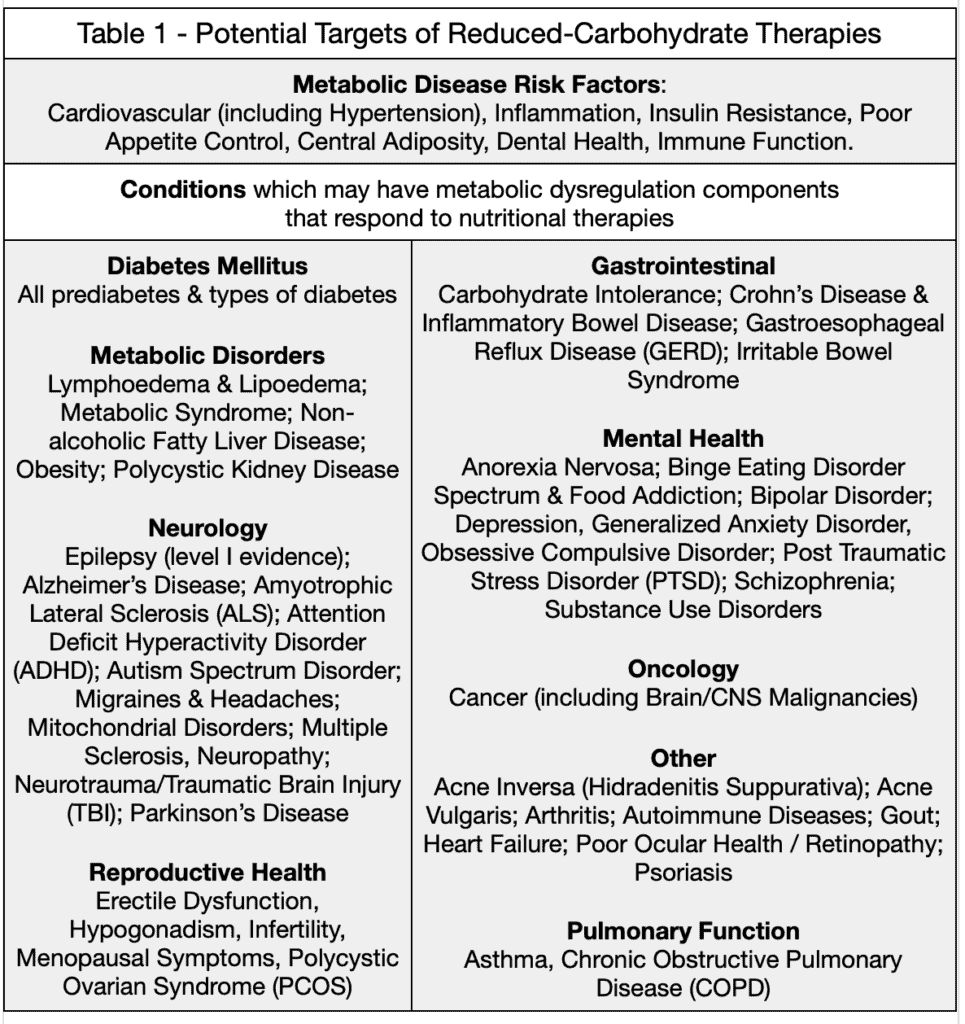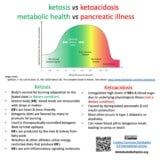Lifestyle Medicine, the key to metabolic healing

What is lifestyle medicine? Is it metabolic healing?
Lifestyle medicine can be the central vehicle for metabolic normalization. Generally speaking, with lifestyle medicine, metabolism is improved with behaviors rather than with the stuff of conventional health care, i.e., surgeries and medications. While surgeries and medications are often lifesaving, they usually don’t improve underlying metabolic dysfunctions that can give rise to chronic disease.
The World Health Organization says that two-thirds of all disease worldwide is the result of lifestyle choices, and the converse is also true. Many diseases can be reversed through positive lifestyle change.
Is lifestyle medicine an accepted form of intervention, or is it fringe woo-woo pseudoscience?
Yes, it is real, accepted practice in healthcare. Although standard medical clinicians often don’t have the time or the knowledge to practice it.
According to the American Academy of Family Practice, Lifestyle medicine “will do more for you than any medication or treatment in the world.” This form of intervention includes optimizing diet, exercise, stress management, and sleep. In other words, this approach to health care is not focused on medications and disease. Rather, it is focused on creating a dynamic collaboration between the clinician and the patient to prevent, treat, and reverse many disease processes.
“… following the increased awareness of the importance of lifestyle for disease prevention, we are now facing a renaissance of nutrition, or lifestyle [optimization] in general, for disease management as well. In this context, disease management not only comprises lifestyle interventions to improve general health and well-being of patients, but also nutritional strategies to stabilize or even ‘reverse’ the disease process itself.”
Renger F. Witcamp, Science Direct
Can lifestyle medicine be used with vegetarian, omnivore, and carnivore dietary patterns?
The term “lifestyle medicine” is often used by the Seventh-day Adventist Church, which also advocates vegetarianism. We at Metabolic Multiplier are diet diplomats, so we don’t advocate for any particular diet beyond finding the one that works well for a particular patient. You can see some discussion of this here and here. You and your clinician will recognize your bio-individuality and use that understanding to work with your body to develop an effective plan individualized for you. With that said, according to Virta Health, a well respected virtual-diabetes-treatment program, finding a dietary pattern with the level of carbohydrate a person can tolerate is often key to treating metabolic diseases like diabetes. Ketogenic dietary formulations may be necessary to treat other diseases such as epilepsy and mental illness. Can you be low carb or keto and vegetarian? Yes, just ask type 1 diabetic, vegan keto dieter, and doctor Carrie Diulus!(1)((1. Sources: Wikipedia “Seventh-day Adventist Church.” Retrieved April 20, 2020. )),(2)((2. Record.AdventistChurch.com https://record.adventistchurch.com/tag/lifestyle-medicine/ Retrieved April 20, 2020.))
Chronic disease and unhealthy lifestyles
Most examples of lifestyle medicine’s success come from treating chronic disorders that are directly associated with an unhealthy lifestyle, specifically obesity, cardio-vascular disease, type 2 diabetes and its comorbidities. However, the list of other diseases for which there is evidence suggesting that healthy nutrition can reduce disease burden and (or) progression is also increasing.
Which diseases can lifestyle medicine treat or reverse?

There are so many! Lifestyle interventions have been shown in research studies to help:
- Metabolic Conditions
- Obesity
- Metabolic Syndrome/Pre-diabetes/Insulin Resistance
- Cardiovascular Disease Risk Factors including Hypertension
- Female Reproductive Health including Polycystic Ovary Syndrome
- Lymphoedema and Lipoedema
- Other Conditions that appear to have a metabolic component
- Mental health conditions including depression, anxiety, Schizophrenia, Bipolar Disorder
- Pain and Inflammation
- Gastrointestinal
Active, patient focused healthcare
Lifestyle medicine is patient-focused, patient-engaged healthcare! The clinician is your guide, mentor, educator, and you are the one in charge of implementation. You are guided to heal yourself with carefully constructed, evidence-based lifestyle interventions developed jointly with your clinician. You and your clinician are a potent healthcare team!
What are examples of lifestyle interventions?
These run the gamut from promoting a good night’s sleep with a warm bath, early bedtime, cool room, and dim lights. For another it could be reversing diabetes with nutritious carbohydrates, reduced eating and exercise. Lifestyle collaboration with your clinician will help you find your best way of exercising, eating, relaxing, sleeping, and socializing. These are broad spectrum interventions that improve a wide swath of health parameters. Improving your life is improving your health!
How does it work?
According to the AMA, lifestyle medicine includes 5 areas, all of which your lifestyle or Keto Treatment Team will be able to provide for you.
- Leadership & Teamwork – the clinician will promote and practice healthy lifestyle behaviors. Practitioners practice what they preach, and they focus on your goals and empowerment!
- Knowledge – clinicians have knowledge about which interventions can create the change you want and they know how to help you make the necessary behavior changes.
- Assessment skills – they can assess your biological, social, and psychological needs, and assess your readiness for various levels of change. They perform appropriate physical examinations, history taking, and relevant testing.
- Management – this includes establishing effective, collaborative relationships with patients and their families. It also includes working with patients to develop specific action plans and medication regimes and referrals (when necessary).
- Office and community support – Clinicians will interact with multiple health care providers, family members, and community members to support patients’ positive changes. They have an open, friendly, and engaging office staff and system to support patients’ health.
Is lifestyle medicine for me?
Ask yourself a few questions to assess whether you are interested in this type of care. If not, don’t worry, a more traditional Keto Treatment Team option might be better suited to your needs.
Lifestyle medicine self-assessment questions?
- Do you want to be an active participant in your health care?
- Would you like to collaborate with your clinicians?
- Do you believe you have the power and strength to improve your health with the help and support of your healthcare providers?
- Are you willing to make incremental, long-term changes in your diet and lifestyle with the help of your clinician?
If your answers are mostly affirmative, you are likely to succeed with lifestyle medicine!
Facts checked by Cecile Seth.
Bibliography
- What is Lifestyle Medicine? An overview from the Baylor College of Medicine.
- Reversing Type 2 Diabetes with Nutritional Ketosis by Virta clinic, a specialty clinic treating metabolic issues with the ketogenic diet.
- Low Carb Diet Lowers Blood Pressure from WebMD
- Insomnia an overview of lifestyle assessment and intervention from The American Academy of Family Physicians Lifestyle Intervention Improves Cardiometabolic Risk Factors in Women With PCOS from Endocrinology Advisor
Other resource guides & toolkits you might value
Curious about improving metabolic health with lifestyle?
- Lifestyle Medicine, the key to metabolic healing
- What is metabolic health? A layperson’s definition and a biochemist’s perspective
Where do I start improving my metabolic health?
- Your patient toolkit for prediabetes & type 2 diabetes
- What to eat? Get clever! Clinicians’ flexible approach to tailoring carb reduction to you.
- Want more detail on carbohydrate reduction? A round-up of quality, what-to-eat guides from around the web
- Best resources for an overview of keto – Metabolic Multiplier’s round up of the best resources we’ve found by evidence-based organizations & clinicians. For patients, families & caregivers.
- Keto doctors near me – over 20 directories of low-carb professionals
For clinicians using therapeutic carbohydrate reduction (TCR), ketogenic diet therapies (KDT)
- Best Keto resources for clinicians & other practitioners
- How to build my ketogenic therapy treatment team – Support for the more complex cases.
- Why write medical case reports about unique cases? – Our round up can save you time.
For colleagues interested in amplifying metabolic health
- Overview schematics help us think about metabolic health – Understand our Organizing Research team‘s thinking behind these 3 metabolic health research portals
- Communication guide to unite advocacy for metabolic health – Suggested language metabolic health advocacy. Principles. Language to use or avoid. Food & lifestyle first.
- Style Guide to unite advocacy for metabolic health – Welcome new team members! Many of you encourage using one voice for metabolic health. Below are suggestions from your fellow clinicians, scientists and professionals. See our Communication Guide as well. We’d love to hear…
- What Foundations support Metabolic Health? Charities, advocacy & grassroots groups using metabolic interventions & health to treat metabolic conditions.











Now I understand that lifestyle medicine can include a ketogenic diet incorporated with the day-to-day practices of exercise and patient-focused medical education. It’s also amazing to know how this can reverse conditions like diabetes. I would be really interested to try this I wonder if their community programs are involved in this health industry.
Claire – Which country / state / big cities are you near? As social animals most of us want company on our journey. Clever Eats – Progressive steps towards metabolic health can get you started if you don’t have any medical conditions.
If you do then find a reduced carb doctor near me can help you find one near you. Doctor Tro & Virta Health both serve much of the US.
If you have prediabetes or diabetes then print out the pdf form our consumer toolkit for prediabetes & type 2 diabetes and take it with you to your clinician.
If you think you are ready to try then we grouped resources under “Convinced Consumers” If you are still wondering then try “Curious “